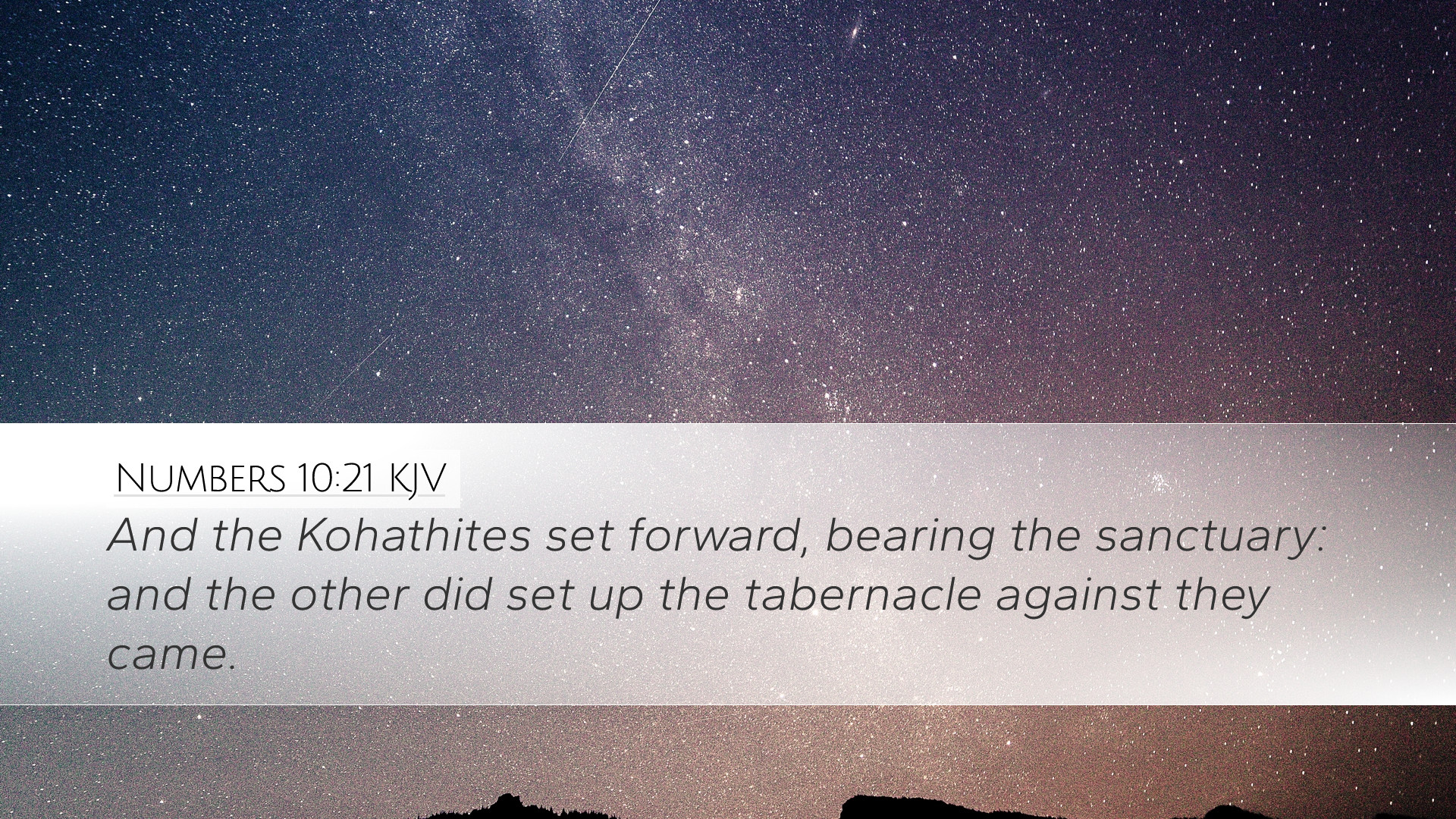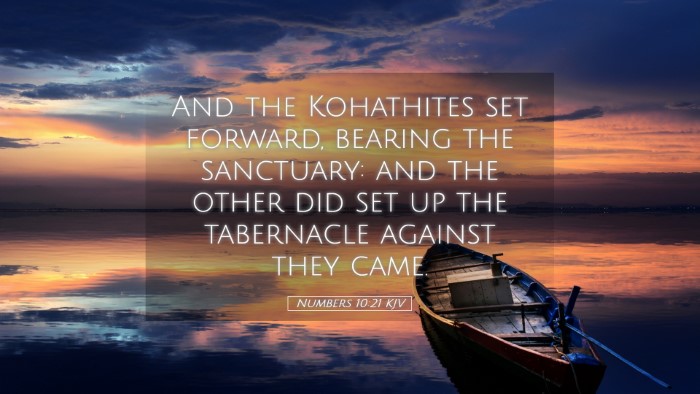Commentary on Numbers 10:21
Verse Reference: Numbers 10:21 - "After that the Kohathites set out, carrying the holy things; the tabernacle was to be taken down and they were to carry it. But the Gershonites and the Merarites were to carry the other things of the sanctuary."
Introduction
Numbers 10:21 provides a pivotal moment in the journey of the Israelites through the wilderness. This verse highlights the organized approach to the movement of the tabernacle and its holy contents, focusing particularly on the role of the Kohathites.
Historical Context
This scripture occurs in the context of the Israelites' journey to the Promised Land, where God instructed Moses regarding the order of encampment and movement. The significance of the roles assigned to the Kohathites, Gershonites, and Merarites reflects divine order in worship and service. Each tribe had specific responsibilities, underlining that service to God requires structure and obedience.
The Role of the Kohathites
The Kohathites were responsible for carrying the holy items of the tabernacle, including the Ark of the Covenant, the table of showbread, and the golden lampstand. This responsibility, while honorable, came with strict guidelines (as outlined in Numbers 4), emphasizing that the holy things must be handled with reverence.
- Matthew Henry: He observes that the Kohathites' responsibility illustrates the sanctity of the holy things and the grave duty of their care. Their designation to carry the sacred implements reflects the seriousness of spiritual responsibility.
- Albert Barnes: In his commentary, he notes that the Kohathite family symbolizes a deeper spiritual truth; they represent the need for spiritual leaders who are tasked with the oversight of sacred duties within the church.
- Adam Clarke: Clarke highlights that the Kohathites’ carrying of the holy things exemplifies the concept of divine appointment. Their task signifies the importance of maintaining the sanctity of worship practices.
Significance of the Tabernacle Movement
The movement of the tabernacle signifies the presence of God among His people. As they journeyed, the very act of carrying the holy items communicated God’s guidance and protection. It was more than just a physical movement; it represented spiritual mobilization toward the fulfillment of God’s promises.
Lessons for Modern Believers
- Order in Worship: The structured approach in moving the tabernacle provides a template for how worship should be managed in the church today. Just as the Israelites moved in an orderly fashion, churches today must have a clear understanding of roles within the body of Christ.
- Respect for the Holy: The handling of the holy items by the Kohathites teaches modern believers about the weight of spiritual matters. There is a need for reverence when approaching God's presence, be it in personal worship or corporate gatherings.
- Teamwork in Ministry: Just as different tribes had distinct responsibilities, today's ministries are most effective when working together toward a shared purpose. The varied gifts and roles within the church should harmonize, reflecting a unity in diversity.
The Other Levite Families: Gershonites and Merarites
In this verse, the distinction between the Kohathites and the other Levitical families is significant. The Gershonites and Merarites had their roles in transporting not the sacred items but the outer curtains and the structural components of the tabernacle.
- Matthew Henry: He points out that while every task seems distinct, all contribute to the worship of God. There is no minor role in God’s service; every responsibility is vital.
- Albert Barnes: Barnes comments on the necessity of these families, noting that without their efforts in carrying the less sacred items, the worship of God couldn't happen effectively.
- Adam Clarke: Clarke emphasizes the collaborative nature of service in the community of believers, recognizing that roles may vary but the goal remains unified – to honor God.
Theological Reflections
This verse encourages theological reflection on how God orders His people. Each family’s specific responsibility signifies that everyone in the church has a role tailored by God’s design. The movement of the tabernacle can be viewed metaphorically as the journey of the believer through life, supported by God’s structures and community.
The Centrality of the Ark
The Ark of the Covenant, which was to be carried by the Kohathites, represents God’s covenant with Israel, a sign of His presence and guidance. Its centrality in the camp echoed God's desire to dwell among His people, which is illustrated vividly in the New Testament through Christ's incarnation.
Conclusion
In summary, Numbers 10:21 serves as more than a logistical instruction; it embodies the spiritual ethos of order, reverence, and community in worship. The responsibilities assigned emphasize the vital roles within the church and inspire modern believers to respect the sacredness of God’s presence in their lives. The journey of the Israelites, under God’s leadership, provides a timeless example of how faith and function must intertwine in the service of God.


